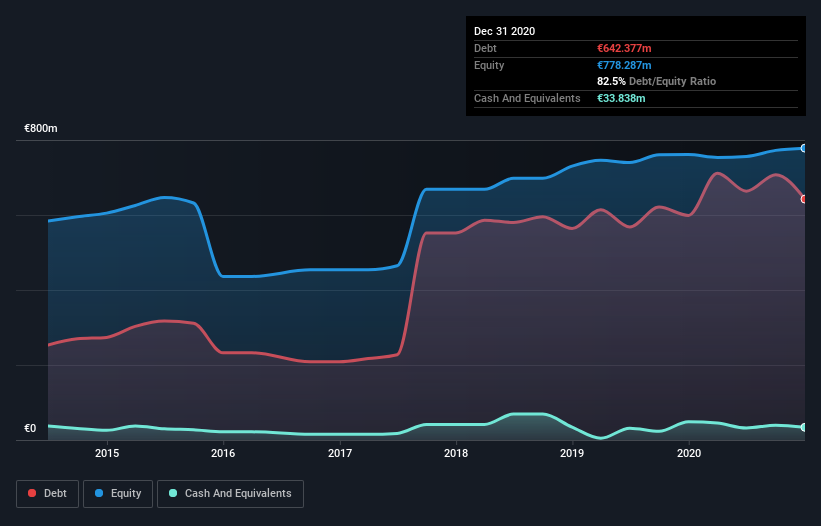- Greece
- /
- Metals and Mining
- /
- ATSE:ELHA
Here's Why Elvalhalcor Hellenic Copper and Aluminium Industry (ATH:ELHA) Is Weighed Down By Its Debt Load

The external fund manager backed by Berkshire Hathaway's Charlie Munger, Li Lu, makes no bones about it when he says 'The biggest investment risk is not the volatility of prices, but whether you will suffer a permanent loss of capital.' So it might be obvious that you need to consider debt, when you think about how risky any given stock is, because too much debt can sink a company. Importantly, Elvalhalcor Hellenic Copper and Aluminium Industry S.A. (ATH:ELHA) does carry debt. But should shareholders be worried about its use of debt?
When Is Debt A Problem?
Generally speaking, debt only becomes a real problem when a company can't easily pay it off, either by raising capital or with its own cash flow. Ultimately, if the company can't fulfill its legal obligations to repay debt, shareholders could walk away with nothing. However, a more usual (but still expensive) situation is where a company must dilute shareholders at a cheap share price simply to get debt under control. By replacing dilution, though, debt can be an extremely good tool for businesses that need capital to invest in growth at high rates of return. When we think about a company's use of debt, we first look at cash and debt together.
View our latest analysis for Elvalhalcor Hellenic Copper and Aluminium Industry
How Much Debt Does Elvalhalcor Hellenic Copper and Aluminium Industry Carry?
As you can see below, at the end of December 2020, Elvalhalcor Hellenic Copper and Aluminium Industry had €642.4m of debt, up from €599.0m a year ago. Click the image for more detail. However, it also had €33.8m in cash, and so its net debt is €608.5m.

How Healthy Is Elvalhalcor Hellenic Copper and Aluminium Industry's Balance Sheet?
We can see from the most recent balance sheet that Elvalhalcor Hellenic Copper and Aluminium Industry had liabilities of €524.3m falling due within a year, and liabilities of €555.7m due beyond that. Offsetting this, it had €33.8m in cash and €253.0m in receivables that were due within 12 months. So its liabilities outweigh the sum of its cash and (near-term) receivables by €793.2m.
This is a mountain of leverage relative to its market capitalization of €825.5m. This suggests shareholders would be heavily diluted if the company needed to shore up its balance sheet in a hurry.
We measure a company's debt load relative to its earnings power by looking at its net debt divided by its earnings before interest, tax, depreciation, and amortization (EBITDA) and by calculating how easily its earnings before interest and tax (EBIT) cover its interest expense (interest cover). The advantage of this approach is that we take into account both the absolute quantum of debt (with net debt to EBITDA) and the actual interest expenses associated with that debt (with its interest cover ratio).
Elvalhalcor Hellenic Copper and Aluminium Industry has a debt to EBITDA ratio of 5.0 and its EBIT covered its interest expense 2.7 times. This suggests that while the debt levels are significant, we'd stop short of calling them problematic. Worse, Elvalhalcor Hellenic Copper and Aluminium Industry's EBIT was down 23% over the last year. If earnings keep going like that over the long term, it has a snowball's chance in hell of paying off that debt. There's no doubt that we learn most about debt from the balance sheet. But it is future earnings, more than anything, that will determine Elvalhalcor Hellenic Copper and Aluminium Industry's ability to maintain a healthy balance sheet going forward. So if you want to see what the professionals think, you might find this free report on analyst profit forecasts to be interesting.
Finally, a company can only pay off debt with cold hard cash, not accounting profits. So we clearly need to look at whether that EBIT is leading to corresponding free cash flow. Considering the last three years, Elvalhalcor Hellenic Copper and Aluminium Industry actually recorded a cash outflow, overall. Debt is usually more expensive, and almost always more risky in the hands of a company with negative free cash flow. Shareholders ought to hope for an improvement.
Our View
To be frank both Elvalhalcor Hellenic Copper and Aluminium Industry's conversion of EBIT to free cash flow and its track record of (not) growing its EBIT make us rather uncomfortable with its debt levels. And even its interest cover fails to inspire much confidence. Taking into account all the aforementioned factors, it looks like Elvalhalcor Hellenic Copper and Aluminium Industry has too much debt. While some investors love that sort of risky play, it's certainly not our cup of tea. There's no doubt that we learn most about debt from the balance sheet. However, not all investment risk resides within the balance sheet - far from it. Be aware that Elvalhalcor Hellenic Copper and Aluminium Industry is showing 3 warning signs in our investment analysis , and 1 of those is concerning...
At the end of the day, it's often better to focus on companies that are free from net debt. You can access our special list of such companies (all with a track record of profit growth). It's free.
When trading stocks or any other investment, use the platform considered by many to be the Professional's Gateway to the Worlds Market, Interactive Brokers. You get the lowest-cost* trading on stocks, options, futures, forex, bonds and funds worldwide from a single integrated account. Promoted
Valuation is complex, but we're here to simplify it.
Discover if Elvalhalcor Hellenic Copper and Aluminium Industry might be undervalued or overvalued with our detailed analysis, featuring fair value estimates, potential risks, dividends, insider trades, and its financial condition.
Access Free AnalysisThis article by Simply Wall St is general in nature. It does not constitute a recommendation to buy or sell any stock, and does not take account of your objectives, or your financial situation. We aim to bring you long-term focused analysis driven by fundamental data. Note that our analysis may not factor in the latest price-sensitive company announcements or qualitative material. Simply Wall St has no position in any stocks mentioned.
*Interactive Brokers Rated Lowest Cost Broker by StockBrokers.com Annual Online Review 2020
Have feedback on this article? Concerned about the content? Get in touch with us directly. Alternatively, email editorial-team (at) simplywallst.com.
About ATSE:ELHA
Elvalhalcor Hellenic Copper and Aluminium Industry
Elvalhalcor Hellenic Copper and Aluminium Industry S.A.
Solid track record with excellent balance sheet.
Similar Companies
Market Insights
Community Narratives




